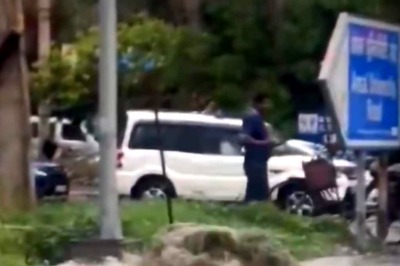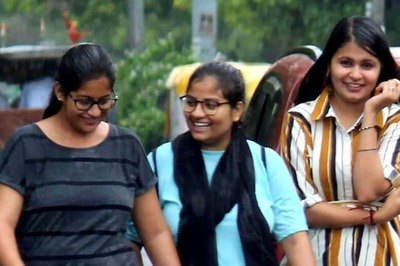
views
New Delhi: The latest set of India-related cables released by whistle-blowing website WikiLeaks include some that have a potential to embarrass India's power elite.
A leaked cable released on March 15 discusses MK Narayanan's possibility of becoming the National Security Advisor (NSA) following JN Dixit's death. Narayanan, now Governor of West Bengal, was then the Acting NSA. The cable labelled "confidential", was cleared by the then US Ambassador to India David C Mulford.
The cable describes MK 'Mike' Narayanan as a long-time Gandhi family loyalist who is part of the traditional "coterie" around the Congress President Sonia Gandhi.
Narayanan along with Principal Secretary TKA Nair, the cable states, constitute a Keralite "mafia" in the Prime Minister's Office. "In a bureaucratic culture dominated by North Indian Hindi speakers, this Keralite lock on the PM's inner bureaucratic circle represents something of an anomaly, which could in the long term create new faultlines around the Prime Minister," the leaked document elaborates on the impact of the "Keralite mafia."
Full text of the leaked cable:
Reference ID: 05NEWDELHI301
Created: 2005-01-12 12:12
Released: 2011-03-15 00:12
Classification: CONFIDENTIAL
Origin: Embassy New Delhi
This record is a partial extract of the original cable. The full text of the original cable is not available.
C O N F I D E N T I A L SECTION 01 OF 04 NEW DELHI 000301
SIPDIS
E.O. 12958: DECL: 01/11/2015
TAGS: PINR PINS PREL PGOV IN PK
SUBJECT: AFTER DIXIT, INDIA PONDERS ROLE OF ITS NSA AND WHO
WILL GET THE JOB
REF...04 CHENNAI 575
Classified By: DCM Robert O. Blake, Reasons 1.4 (B,D).
1. (C) Summary: Two questions now swirl around India's National Security Advisor position: will it lose its major role in the Indian foreign policy establishment, and who will land the job permanently? JN Dixit's death has prompted media speculation that PM Manmohan Singh is reassessing what he wants from his next NSA and how the NSA system should function. This has led Indian strategic commentators to posit that the NSC structure may be reinvigorated as the Congress Party pledged during last year's election campaign. That structural issue notwithstanding, Special Adviser to PM Singh and Acting NSA MK Narayanan clearly has the inside track to succeed Dixit, based on proximity and personal relations with Mrs. Gandhi, but there are also other serious contenders. This cable provides biographic information on Narayanan. End Summary.
2. (C) JN Dixit's untimely death on January 3 has set the stage for changes in the NSA position and the NSC system that were predicted but never came to fruition after last May's change of government. According to numerous well informed press accounts and non-government contacts, the PMO is treating Dixit's death as an opportunity to re-evaluate and perhaps re-engineer the national security architecture at a time of relative quiet in India-Pakistan relations and Indian foreign policy generally. The loss of the incumbent NSA, and his interim replacement with a seasoned bureaucrat who already has a good working relationship with the PM, gives the GOI breathing space to tweak the NSA/NSC system, and Indian strategic thinkers have been quick to suggest changes.
The Next NSA: Less Adviser, More Chairman?
------------------------------------------
3. (C) The buzz surrounding PM Singh's decision to rethink what the NSA and NSC should do -- irrespective of who holds the post -- is based on the 2004 Congress Party election platform pledge to make the NSC ""a professional and effective institution."" This in turn was a dig at Brajesh Mishra's role as the power behind Vajpayee on a broad range of political and foreign policy matters. Structural changes were predicted after Congress came to power last May, but faded quickly from the agenda following Dixit's rapid occupation of the same ""super minister"" role played by his predecessor. Speculation lingers around a partial shift in the NSA's work balance away from its current advisory role toward greater management of the NSC as an organization. Any substantial redefinition of the position would probably take some time (and a measure of conscious self-restraint by the incumbent). However, the current calm in Indo-Pak relations and the presence of an experienced hand as Acting NSA will provide breathing space to do so.
4. (C) The eminence grise of Indian strategic thinkers, K Subramanyam, has been arguing that India needs an NSA at the helm of a fully functioning NSC dedicated to addressing India's strategic needs, as originally mandated. In a series of essays, he has argued for the NSA to play this role, rather than being the PM's point-man on the foreign affairs issues of the day, as the position became when Mishra and Dixit held it. ""Indian Express"" strategic affairs editor Jasjit Singh has observed that much of Mishra's authority grew out of his other role as Principal Secretary to the PM, which removed the impetus to create a durable NSC that remains absent to this day. ""Hindustan Times"" foreign affairs correspondent and National Security Advisory Board (NSAB) member Manoj Joshi wrote recently that PM Singh's reassessment would provide an opportunity to split the NSA away from dealing with Islamabad, most notably through the back-channel with Pakistan's NSA Tariq Aziz, and to put this issue ""back where it belongs"" -- in the Foreign Ministry. A January 6 ""Times of India"" news report speculated that the internal and external security elements of the NSA position might be bifurcated.
5. (C) Redefining the NSA as the active NSC chair also poses a geographical problem if it is to remain in the forefront of GOI policymaking. Mishra and Dixit sat in the PMO, down the hall from the MEA, which kept them firmly in the loop on foreign policy decisionmaking. The NSC staff, in contrast, works out of a decrepit building on the other side of town, far from the corridors of influence. For now, this location symbolizes the NSC's marginal role in Indian foreign policymaking.
Narayanan Has the Edge
----------------------
6. (C) By most accounts, PM Singh,s Special Advisor MK (""Mike"") Narayanan, who became Acting National Security Advisor on January 4 after Dixit's death, has the inside track to become his permanent replacement. Narayanan brings over four decades of experience in the Indian intelligence community, and as a long-time Gandhi family loyalist is seen as part of the traditional ""coterie"" around Congress Party President Sonia Gandhi.
7. (C) That said, the Indian media has been awash with the names of other NSA aspirants, many of whom possess far stronger foreign policy credentials than Narayanan. This list includes (based on diplomatic and media gossip): -- Former Cabinet and Defense Secretary and Ambassador to Washington Naresh Chandra -- Gandhi family confidant and Ambassador to the US Ronen Sen -- Former High Commissioner to Pakistan and Rajiv Gandhi PMO veteran G Parthasarthy -- Former Foreign Secretary and recently-appointed Arunachal Pradesh Governor SK Singh -- Former Foreign Secretary and Indo-Pak Track II activist Salman Haidar -- Former Ambassador, Afghan Coordinator and National Security Advisory Board Convenor SK Lambah -- Former Ambassador to China Chandrashekhar Dasgupta -- Former Foreign Secretary MK Rasgotra -- Former Foreign Secretary K Ragunath -- Former Foreign Secretary Muchkund Dubey -- Former Defense and Home Secretary and Kashmir Interlocutor NN Vohra -- Former Ambassador Lalit Mansingh
The Indian press has been quick to handicap the ""contenders,"" many of whom have been promoting their own suitability. For example, Sen arrived recently in Washington; Haider is considered too dovish for this post; and Lambah and Dasgupta are seen as political ""light-weights.""
He's No Dixit
-------------
8. (C) Unlike Dixit and Mishra, Narayanan is not a former Foreign Service Officer, and has not served overseas in any capacity; he thus does not enjoy a network of loyalists within the MEA bureaucracy, a break with tradition if the NSA position becomes more inter-ministerial in nature. Unlike Dixit, who served as MEA spokesman earlier in his career, Narayanan also has not cultivated the Delhi press corps. When Narayanan took the position of Special Adviser to the PM, he made it clear that he had no interest in challenging Dixit for his ""executive duties,"" and had no interest in the ""glamorous part of the (NSA) job,"" an attitude that may dovetail with whatever NSA/NSC restructuring emerges.
Early Tests Likely
------------------
9. (C) If Narayanan continues as NSA, he will face an early test as both Intelligence Bureau head AK Doval and Research and Analysis Wing chief CD Sahay are due to retire on or about January 30. The IB succession will probably be straightforward, but some Indian press accounts suggest that RAW officers are concerned that Narayanan, whose IB background makes him by definition and institutionally
skeptical of RAW, would look outside the organization for Sahay's successor, and might bring in a senior IB officer for the job.
10. (C) Narayanan -- or whoever becomes NSA on a permanent basis -- will also have his hands full with other intelligence issues, not the least of which is the ongoing review of RAW operations that began with last spring's revelation that RAW Joint Secretary Rabinder Singh had been spiriting away classified information before he spirited himself out of the country. Media reports of his supposed whereabouts surface from time to time, most recently suggesting he was spotted in Virginia in December. If Narayanan does become NSA, long-serving RAW officers may try to obstruct reforms initiated by a former IB head.
11. (C) If he inherits Dixit's diplomatic role with Pakistan, China, and the US, Narayanan will suffer several disadvantages, the most important of which is a lack of practical negotiating experience. As demonstrated in his effective dialogue with Tariq Aziz and with the US over NSSP, Dixit was one of India's most respected diplomatic practitioners -- well versed in the arts of listening, compromise, and working to a bottom line. As a former Ambassador to all of India's neighbors, and an Urdu speaker as well, Dixit was uniquely equipped to manage India's regional relationships.
An Intelligence Professional
----------------------------
12. (C) Narayanan joined the Indian Police Service (IPS) in 1955 and spent his first four years with the IPS in Tamil Nadu. Calm, analytical, discreet, and cosmopolitan, he comes across as a classic intelligence analyst type. It is not unusual for a conversation with Narayanan to consist largely of questions. Although his writings have occasionally been critical of ""the West,"" he has not shown visceral anti-US attitudes. His many years of service to the Gandhi family earned him his post as Special Advisor, where he serves as a behind-the-scenes coordinator for intelligence activity -- including India's Northeast and Nepal, areas of concern to New Delhi on a daily basis. His position as Special Advisor carries with it the rank of Minister of State. As Special Advisor, Narayanan was open, accessible, and friendly to Embassy officials, but usually in a listening mode.
13. (C) He became one of Prime Minister Indira Gandhi's confidants after moving to the IB, India's primary internal intelligence service, in 1960. Narayanan's experience in Tamil Nadu made him an effective figure in intelligence activities involving Sri Lankan Tamil issues after Rajiv Gandhi appointed him IB Director in 1987. US Consulate General Chennai officials recall his repeatedly expressed and profound distaste for the LTTE. He is also known as an expert on the Indian Left and communism.
14. (C) In 1990, Prime Minister VP Singh moved Narayanan from the IB to become Chairman of the Joint Intelligence Committee and Secretary of the National Security Council. Less than a year later, Prime Minister Chandra Shekhar, whose government was supported by the Congress Party, reappointed him as IB head, and Narayanan retired from that post in 1992. After retirement, he served as Senior Advisor on National Security Affairs to Prime Minister Narasimha Rao and as a member of Prime Minister Vajpayee's NSAB from 998-2001. He also served on two task forces on intelligence and internal security set up in the aftermath of the 1999 Kargil War. Narayanan is also a founding, but now inactive, member of the Center for Security Analysis, a Chennai-based think tank. 15. (C) Narayanan once related to CG/Chennai an anecdote from his days as Senior Advisor to PM Rao: Narayanan outlined how he had written a report and gave it to an aide to deliver to the PM. After reading the report, the aide commented that he could not deliver such nformation, at which Narayanan said that he responded, ""I am not here to please, but rather to inform the PM.""
Need for ""Holistic Synergy"" on Kashmir, Pakistan
--------------------------------------------- ---
16. (C) During his retirement years, Narayanan revealed particular interest in Pakistan and Kashmir through weekly columns he contributed to ""Asian Age"" (expanded excerpts reftel). In them, he argued that only a small minority of Kashmiris supported the militancy, and most were angered that the 2002 elections did not lead to a drop in violence. An ""early solution appears difficult,"" he wrote in January 2004, and in March he expanded that ""Neither 'cleverness' nor 'shortcuts' can help. Creating a holistic synergy is necessary, (but) each side is more intent on blaming the other of being obstructive ... than in progressing the dialogue. Neither side has been able to rise above narrow interpretations and preoccupations.""
Personal Data
-------------
17. (C) Born on March 10, 1934 to a Kerala Nair (non-Brahmin, upper caste) family, Narayanan completed his bachelor's degree at Madras Christian College. He and his wife Vijaya, also a Keralite, have a son, Vijay, and a daughter, Meena. Their son-in-law Ajit Nambiar is Chairman and Managing Director of BPL Ltd, a consumer-durable manufacturing company, on whose board of directors Narayanan has served. After retirement, Narayanan made Chennai his permanent home, and his wife remains there, as does his mother. When he became Special Adviser to PM Singh, he often spent weekends in Chennai, which will probably cease if he becomes NSA on a permanent basis.
18. (C) According to a January 17 ""Outlook"" weekly profile by its foreign affairs correspondent V Sudarshan, Narayanan is a teetotaler and a fitness buff. He also travels to Kerala every winter to visit the Hindu temple in Sabarimala, South India's largest pilgrimage site. Narayanan has visited the US several times, and has delivered speeches and lectures in excellent English. He is an honorary member of the International Association of Chiefs of Police, a rare
distinction.
19. (C) Along with Principal Secretary TKA Nair, Narayanan constitutes what is now a Keralite ""mafia"" in the PMO. In a bureaucratic culture dominated by North Indian Hindi speakers, this Keralite lock on the PM's inner bureaucratic circle represents something of an anomaly, which could in the long term create new faultlines around the Prime Minister.
MULFORD




















Comments
0 comment